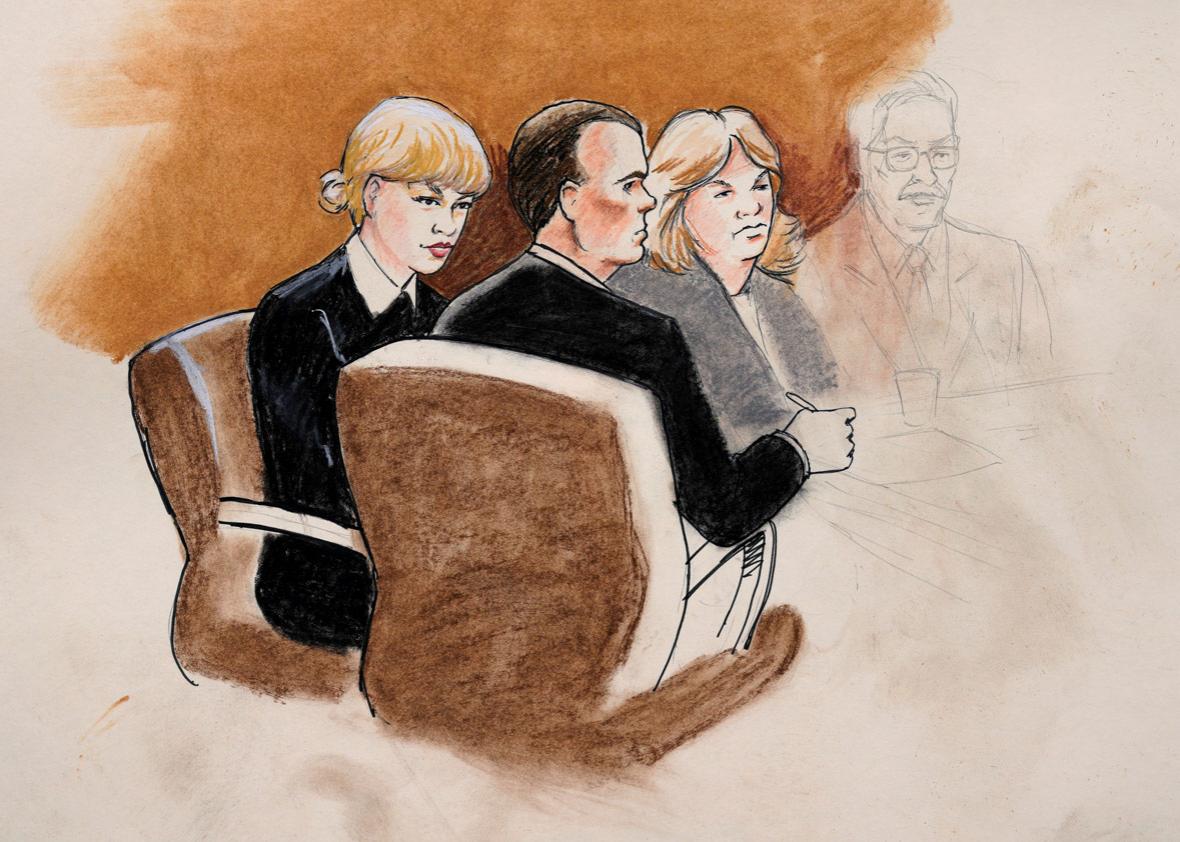Taylor Swift took the stand on Thursday in a Denver federal courthouse to describe the moment in 2013 when she says she was “violated” by a then–country radio DJ in a way she “had never experienced before.” David Mueller, who was 51 to Swift’s 23 at the time, “grabbed my ass underneath my skirt,” Swift said in her testimony. He “stayed latched on to my bare ass cheek as I moved away from him, visibly uncomfortable.”
Mueller claims he never touched Swift’s butt, explaining at various points that he only touched her “rib cage” and that a colleague was probably the one who groped her. They were posing for a photo, he said, and their body language was awkward but not inappropriate. On the witness stand, Swift did not suffer that argument, insisting that the grope was intentional and could not have been an accident. “It was horrifying, shocking,” she said, according to a BuzzFeed report. “He had a handful of my ass. I know it was him. I thought what he did was despicable.”
On Wednesday, Swift’s mother, Andrea, testified that the family hadn’t gone to the police after the alleged assault because they didn’t want to cause a public uproar. “I did not want this event to define her life,” she said. “I did not want every interview from this point on to have to talk about it.” Instead, they contacted Mueller’s employer—he was backstage at Swift’s concert on a work assignment when the alleged incident took place—who fired him two days later. Two years after that, Mueller sued Swift for $3 million, alleging that she cost him his job for an assault that never happened. She countersued for $1, determined to prove that she wouldn’t back down from what she says is the truth.
When Swift and her team told Mueller’s radio bosses about the alleged assault, they enclosed a photo that appeared to show Mueller with his hand behind Swift’s butt. In court this week, both parties attempted to use that photo, a sealed document that leaked last year, to prove their respective points. Swift’s side says it shows that she’s edging toward Mueller’s girlfriend and away from him, and that his hand is clearly far below her ribcage. Mueller’s attorney Gabe McFarland asked Swift why the photo shows the front of her skirt in place, not lifted up, if Mueller was reaching underneath to grab her butt. “Because my ass is located in the back of my body,” Swift replied. She offered a similar response when asked whether she saw the grope taking place. When McFarland pointed out that the photo shows Swift closer to Mueller’s girlfriend than Mueller himself, Swift answered, “Yes, she did not have her hand on my ass.”
Swift has said several times that she wouldn’t settle with Mueller or let his claims stand because she wants to be a visible example of strength to other women considering their options after a demoralizing sexual violation. Full of rightful exasperation, her testimony on Thursday was a galvanizing example of a so-called victim testimony in which the victim refused to be victimized. Swift was confident in her version of the story, unintimidated by a cross examination that implied she was a liar and unmistakably incensed when McFarland tried to cast doubt on her behavior during the evening in question. Wasn’t Swift critical of her bodyguard, who didn’t prevent such an obvious assault? “I’m critical of your client sticking his hand under my skirt and grabbing my ass,” she told the attorney. But, McFarland said, Swift could have taken a break in the middle of her meet-and-greet if she was so distraught. “And your client could have taken a normal photo with me,” Swift countered, explaining that a pop star has a responsibility to her fans.
For young fans of Swift’s, hearing a beloved artist speak candidly about the emotional damage of sexual assault and stand up to a courtroom of men trying to prove her wrong could be a formative moment for their developing ideas of gender, sex, and accountability. Swift certainly has advantages most women who endure similar violations will never have: the money and time to mount a strong case against her alleged assailant, the jury-endearing privileges of white skin and a beautiful face, and millions of supporters rallying publicly behind her. And since he’s suing her for money and she’s already one of the biggest superstars in the world, detractors can’t argue, as they so often do in sexual-assault cases, that she’s making up a story for money or fame.
But Swift also faces some of the same obstacles other assault survivors endure if they bring their perpetrators to court. She must relive a distressing moment over and over again to dozens of observers, recounting in detail how her body was allegedly touched without her consent, while lawyers on the other side try their hardest to make her look unreliable, petty, and fake. When McFarland asked her how she felt when Mueller got the boot from his job at the Denver radio station, Swift said she had no response. “I am not going to allow your client to make me feel like it is any way my fault, because it isn’t,” she said. Later, she continued: “I am being blamed for the unfortunate events of his life that are a product of his decisions and not mine.” Women who allege sexual assault are scolded all the time for ruining men’s lives, even if those men are proven guilty. Swift’s sharp testimony is a very visible condemnation of that common turn in cases like these. That’s an important message for women who may find themselves in Swift’s position someday, and maybe even more so for the men who’ll be called on to support or rebuff them.
